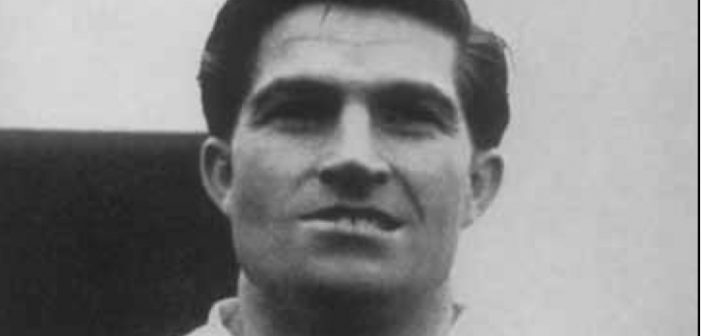LISBON LION Bertie Auld celebrated his 82nd birthday yesterday by sharing his memories of his first day at Celtic and meeting the wonderful Jimmy McGrory, who was manager at the time.
Today, in another EXCLUSIVE for CQN, the Hoops legend reveals all about the time when he realised he would have to leave the club he loved.
The former midfield maestro told all in his book, ‘A Bhoy Called Bertie’, co-authored by Alex Gordon.
THIS immaculately-dressed individual in a beautifully-tailored camel-hair coat stood in front of me in the Tynecastle dressing room. He was about six foot two inches tall, sporting an expertly-trimmed moustache, and he fixed me firmly in his gaze. He said, ‘I want you to join my club. I’ll be talking to Celtic about you. Expect a call tomorrow.’
Honestly, I didn’t recognise the dapper gentleman who had taken such a shine to me. More than just a little bit bewildered, I made my way home that evening. Who was this mysterious stranger?
The following day I turned up for training as usual. Obviously the mood in the camp was one of deep despondency. Celtic had been massive favourites to beat Dunfermline in the Scottish Cup Final replay the night before. They had failed spectacularly against a club that wasn’t long out of the Second Division. A 2-0 defeat wasn’t in the script that April evening in 1961.
Obviously, I couldn’t have realised it at the time, but my one and only appearance in the national tournament that year would be my last first team outing for Celtic this time around. I was in my usual berth at outside-left when we beat Falkirk 3-1 in the first round on 28 January. Actually, I had played in the three previous league matches, a 3-1 victory over Aberdeen, a 4-0 triumph over Airdrie and a 2-1 defeat from St.Mirren.
I didn’t play in every match, but it would be fair to say I was something of a fixture in the first team squad. I had absolutely no thoughts about leaving the club; none whatsoever. Someone at Celtic had other ideas, though.
I was awaiting the call that the manager wanted to see me. In his normal forthright manner, Jimmy McGrory told me an English First Division club wanted to buy me. They had offered £15,000 and the directors were willing to accept the bid. To be honest, it was a shattering blow to discover Celtic were quite content to allow me to leave. I felt sick in my stomach.
I was then informed the club who wanted to sign me were Birmingham City. The suave gent from the night before had been none other than their manager Gil Merrick, the former England international goalkeeper. I should have recognised him, but he looked completely different without his football clobber on. He certainly scrubbed up well.
I found myself in a quandary. What should I do? I didn’t want to go, but something within me told me I didn’t want to hang around some place where I wasn’t wanted. What went wrong? Why was I being moved on? My old Parkhead chum Paddy Crerand had a theory that might not be too far off the mark. He insisted, ‘Those in power at the club at that time wanted rid of Bertie. He was a typical Glaswegian and wasn’t afraid of answering back. That was to be his downfall at Celtic. Bob Kelly didn’t like his style.’
Yes, I admit I wasn’t slow to give my opinion. If I didn’t agree with someone I was hardly going to sit there and nod my approval. I’m not a particular fan of yes men. If you are in a dressing room and someone is spouting something you think is not quite right I don’t see much wrong in throwing in your tuppence worth.
Footballers aren’t robots, you know. You can’t programme them, wind up the key and send them out to play. We are human beings and, as such, I always thought I could contribute something extra to the thought process if or when it was possible. That wasn’t welcome at Celtic at the time. There was an almost puritanical streak at the club. The directors would frown when they saw an individual fly into a tackle. It didn’t matter that it was perfectly fair and all above board. Their idea was to play football in an almost Corinthian fashion. ‘Play up and play the game.’ All that sort of nonsense.
The directors would take their usual seats in the stand and witness their own players being kicked black and blue by their opponents. Yet you knew if you went in hard and someone from the other club was hurt then there was every chance you wouldn’t be playing the following week as a punishment. It was so naive of our directors.
They had a vision of how the game should be played, but you can’t do much if you don’t have the ball. Unless your opponents are in a very benevolent mood and give you the ball constantly, you’ve got to go and win it. Simple? You would have thought so, but others, who really didn’t know too much about the game, had different ideas and I didn’t always agree with them. The easy option was to remain silent as a lot of others did. Ironically, Paddy was similarly minded and that’s probably why Celtic allowed him to go, too! Mind you, he went on to to do great things at a team called Manchester United.
Although things weren’t quite right at the club, I still loved Celtic. They were my team, but there were some puzzling aspects of being a Celtic player back then. Who, for instance, picked the team? Obviously, it should have been the manager, but no-one was quite sure. Mr.McGrory would put up a team sheet on a Thursday night after the weekly board meeting and it would be a changed line-up by Friday afternoon.
You didn’t require Sherlock Holmes-like qualities to detect the chairman, Bob Kelly – later to become Sir Robert – had the final say. Here’s an interesting wee story. The players used to gather in a room on matchday at Celtic Park about one-thirty in the afternoon if it was a three o’clock kick-off. We would play snooker and so on. I would make some sort of excuse about going to the loo or something and duck out. I would go to the home dressing room to see if my boots had been looked out and were in the No.11 position.
I would be happy when I saw them there. I would nick in half-an-hour later just to make sure they were still in place. Somehow they would have found their way to the No.7 position. At least, I was still playing. Then the team would be read out and there was no Bertie Auld in it. After all that, I wasn’t playing. Thankfully, things changed rather dramatically when Big Jock arrived in March 1965. There was only going to be one person picking the team after that and we all knew exactly where we stood. It’s was Jock’s way or no way and the board got the message. There was to be no more meddling in team affairs. About time, too. It’s my belief that most directors’ knowledge of football could be written on a fly’s backside and there would still be room for some more!
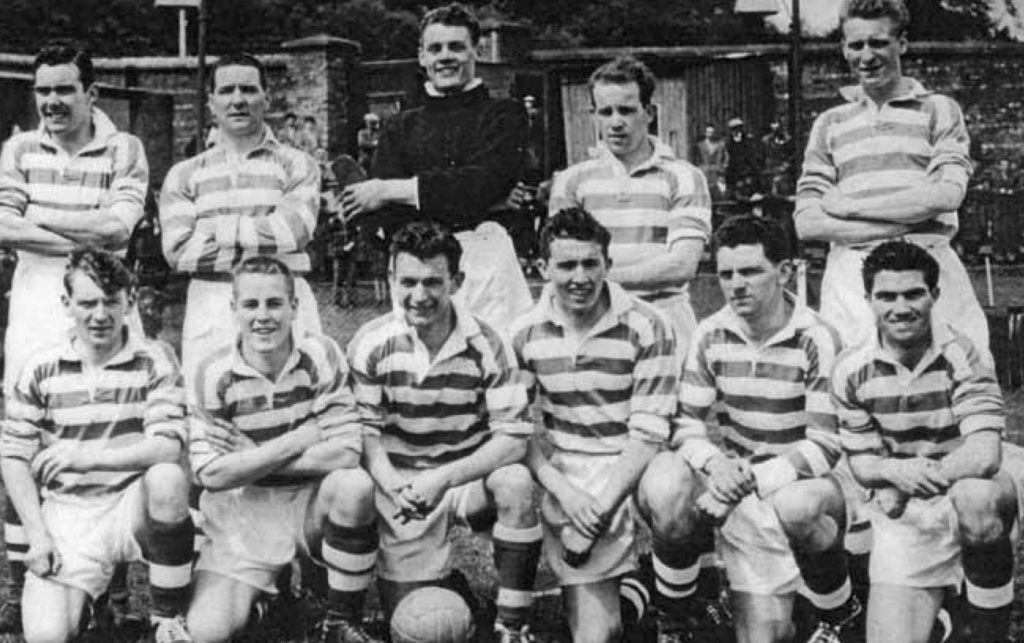
“CELTIC ON TOUR…this is the Celtic team that beat Derry City 7-0 in Ireland on May 17, 1958. That’s me in the front row extreme right. The line up is, back row (left to right): Dunky Mackay, Neilly Mochan, Frank Haffey, Eric Smith and Billy McNeill. Front row: Matt McVittie, Jim Conway, Bertie Peacock, Mike Jackson, Sammy Wilson and yours truly.”
Bob Kelly’s influence on team selection was emphasised one afternoon on 1 October, 1960, as our team bus was wending its merry way to Broomfield, the quaint home of Airdrie Football Club. The chairman recognised one of the Celtic supporters, bedecked in a huge woolly green-and-white scarf, walking towards the same destination. ‘That’s one of our reserve goalies, isn’t it?’ asked Kelly. It was, indeed, an individual called Willie Goldie, and Kelly ordered the bus to be stopped.
Goldie was invited on board and he didn’t only get a lift to Broomfield, he also played! Kelly was so impressed with his commitment to Celtic that Goldie suddenly found himself in goal. John Fallon, who had been in position for the previous four league games, was dropped. Just like that. Celtic duly lost 2-0. By the way, Goldie got plenty of opportunities after that to support the club from the terracings – he never played in the first team again! Actually, I owe him a big thank-you for helping restore me to the first team. I missed the game against Airdrie with Alec Byrne playing outside-left, but I returned for the next match and scored two goals in a 4-2 victory over St.Mirren.
Yet, even in the midst of these bizarre team selections and other odd goings-on, I still wanted to remain a Celtic player. I knew Bob Kelly had tried to get rid of me earlier when Bobby Collins was about to join Everton. Our chairman tried to persuade the Goodison Park side to make it a double deal and throw me in, as well. I was having none of it.
For a start, I was in love! I had met this fantastic girl called Liz at the Locarno Ballroom in Sauchiehall Street, Glasgow, one Saturday night and it was love at first sight. She is now Mrs. Auld and we married on 28 January, 1963 at St.Andrews Church in the shadow of Birmingham City’s ground. At that time, though, we had just started going out with each other and I realised a transfer to Merseyside would mean the end of our all-too-brief relationship. That wasn’t going to happen and no-one was going to force me into leaving Celtic or Glasgow.
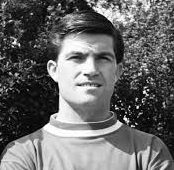
‘BIRMINGHAM BERTIE? Doesn’t sound right, does it?”
When Birmingham City came on the scene it was a different proposition. Liz and I were an item, as they say, so a shift across the border wasn’t out of the question if we both agreed it was the right thing to do.
After talking to Jimmy McGrory, I decided the very least I could do was to speak to the Bimingham City manager. I was sad in my heart, but I thought it was only polite to meet again with Gil Merrick. At least, this time I knew his name. I was immediately impressed by the man. He gave me the notion he only wanted me; no-one else. He knew exactly what he wanted me to do for his club and he was exceptionally persuasive.
I found myself thinking maybe it wouldn’t be a bad idea if I looked into this a bit more carefully. He was offering me the opportunity to go to England and play against the likes of Spurs, Manchester United, Chelsea, West Ham and so on. There were so many personalities down there at the time. There was my old mate Denis Law at United, Dave Mackay had joined Spurs and West Ham had youngsters such as Bobby Moore, Martin Peters and Geoff Hurst beginning to emerge. Of course, that trio would win the World Cup with England some five years later.
After a quick word with Liz, I decided to move to Birmingham City. Genuinely, I thought it was the way ahead for me. Exciting times were around the corner, but my career at the St.Andrews outfit almost didn’t even get off the ground. But for a chance happening, I would have been on the train back to Glasgow only hours after meeting the board of directors.
Honestly, they couldn’t have been more welcoming. The men who owned the club and the directors couldn’t have been more accommodating. Gil Merrick, too, was there as the red carpet was rolled out. Actually, Birmingham City reminded me so much of Celtic in a sense. It was like one big family and I was impressed by the mere fact they actually cared about me.
I had travelled down by train on my own, utterly convinced I was doing the right thing. Liz had packed my holdall, two pairs of socks and two pairs of underpants. She must have listened to my mum who continually insisted, ‘Always have fresh underpants – you never know when you might get hit by a bus!’
Gil Merrick and one of his coaching staff, a chap called Don Dorman, accompanied me from the football ground at St.Andrews to the Midlands Hotel which was situated near the railway station. Gil, as ever, was kindness personified. ‘If there’s anything you need, Bertie, just let me know.’ Nothing was too much trouble and I really appreciated that.
Once they departed, I thought I would go out and have a walk around the city where I would be plying my trade to a whole new set of supporters. But it almost didn’t happen. I was walking up Corporation Street and caught sight of myself in my reflection in the window of a giant store called Racham’s, which looked like Bimingham’s version of Glasgow’s Fraser’s.
I stopped and looked at myself. Suddenly, I thought, ‘Ach, what am I doing here?’ And with that, I turned on my heel and headed back to the hotel where I had every intention of picking up my holdall and getting on the first train back to Glasgow. Then fate stepped in.
As I was preparing to leave my room, someone knocked on the door. I answered and there was Don Dorman standing in the hallway. He said,’Do you mind me in your company?’ I was more than just a tad bewildered. He admitted things weren’t quite right at home and he and his wife were going through a rough patch. I invited him in. What on earth was I going to do? Don had no inkling that I was about to quit his club and get back up the road as swiftly as possible.
We went for a coffee and then a bite to eat. If Don had been even five minutes late in coming to that door, I would have been off and my career would have been in jeopardy. That’s if I still had a career. Birmingham City had just paid £15,000 for me and they held my registration. I don’t think they would have been too pleased with my disappearing act and they could have put me out of the game altogether. Who could have blamed them?
Thankfully, that rather awkward situation did not develop. Don sidetracked me and I stayed the night in the Midlands Hotel before reporting for training the next morning. Remarkably, I made my debut for Birmingham in the Inter-Cities’ Fairs Cup Final against Italian side AS Roma a week or so afterwards. I couldn’t have asked for a more glamorous occasion in which to perform at St.Andrews for the first time.
Before the game, Gil Merrick and his coaches, one was Spanish, I seem to recall, were talking to the players in the dressing room. They were meticulously going through our team and what they expected of each individual. They were talking tactics and suchlike and I was mesmerised. This sort of thing did not happen at Celtic, believe me. At Parkhead, I would be given the No.11 shorts and told to beat the full-back, get down the wing and hurl in crosses for the main strikers. If I chipped in a goal or two myself, all well and good, but my priority was to serve the frontmen with a steady stream of balls into the penalty box.
Now I was sitting in a different dressing room and it might as well have been a different world. Our manager was talking about set-pieces, systems and so on. I was transfixed. He would take time out to point to an individual and tell the rest of the team how they should treat him. ‘Get the ball to Bertie,’ he would say. ‘He’ll bring a new dimension to our play. You will all like what you see from this player.’
I sat there, drinking all this in and I couldn’t wait to get started. There was one problem, though – the Birmingham City shirt was BLUE! Bertie Auld in Rangers’ colours? What a shocker! I made sure I put on a vest under that blue top. Only joking!
My first game, watched by a reasonable crowd of 21,000 at St.Andrews, finished in a 2-2 draw in the first leg and we lost 2-0 the return in Rome where 60,000 fanatical Italian supporters turned out to create a magnificent atmosphere. I had desperately wanted to repay everyone at my new club for their faith in me, but it wasn’t to be. However, I would have better luck against another Italian team in a European Final six years later, of course.
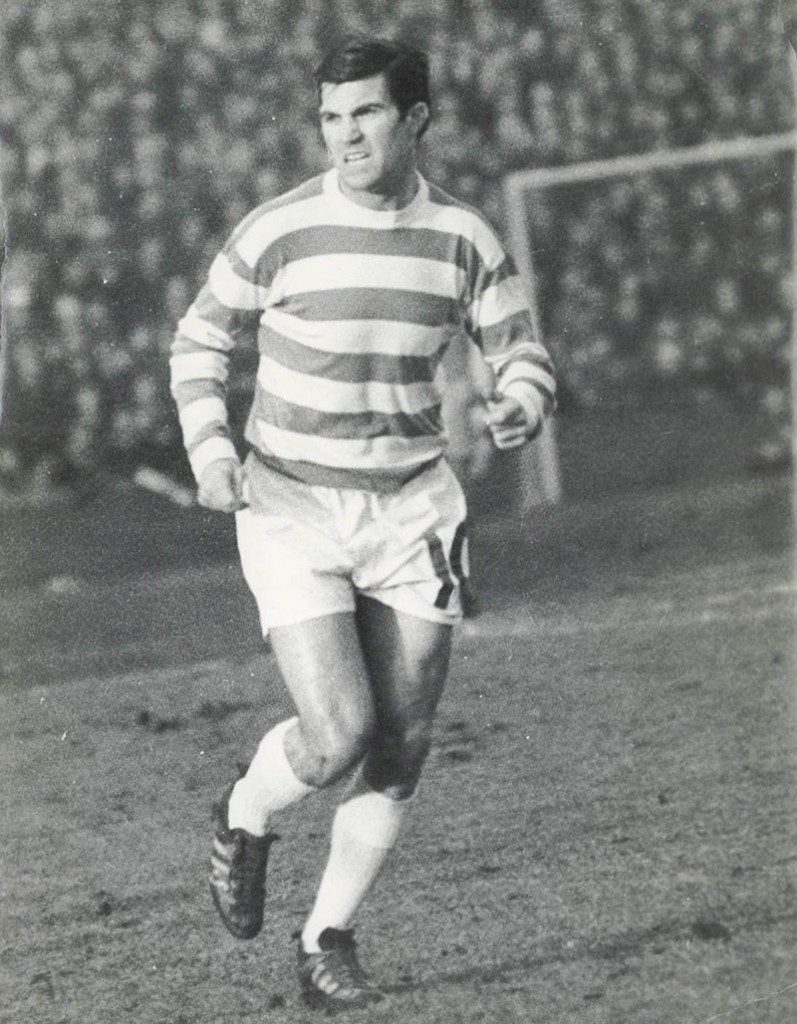
“Undoubtedly, playing in England with Birmingham City had a great influence on how I performed when I returned to Celtic in 1965.”
I became a better player for my experience in English football, I am convinced of that. I was mixing with so many good players and learning from them. Birmingham City fans were passionate about their team although not on a scale of anything I ever experienced at Celtic with their supporters. Mind you, you would have to travel far and wide to find a set of fans like the Celtic crowd. I really mean that. My dad was absolutely right when he said they were the most knowledgeable in the game. I thought that the day I signed first time around and I still believe it to be true today.
At Birmingham, I was encouraged to come inside a bit more often. Gil Merrick left before I returned to Celtic and a guy called Joe Mallett took over. He was the first manager to encourage me to come in from the touchline. At Celtic, as I said earlier, my job was to get down that wing and thump over as many crossballs as I could in ninety minutes.
But the support in England were a bit different in their outlook to the game. Instead of haring down the touchline all day, they would applaud you if you hit an accurate long-range pass across the pitch to switch play. I found myself venturing inside a bit more often than in my days in Glasgow. I enjoyed it, too. It was adding a new dimension to my play and I was getting a bigger and clearer picture of what was developing all around me. It was an education and I thrived on my new responsibilities.
I’ll tell you this, though, and I wouldn’t blame you one bit if you didn’t believe me, the day I left Celtic I instinctively knew I would return. And so, of course, it proved.
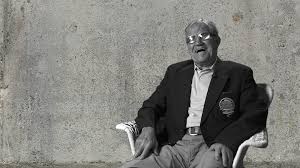
‘LAUGHING BHOY…and is it any wonder I can smile after the career I had at Celtic?”
* TOMORROW: Don’t miss Bertie’s thrilling Old Firm memories – only in your champion CQN.

